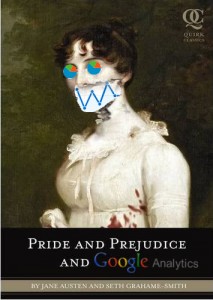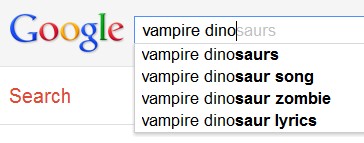The people in my head often ask me, “Caleb, how are you seemingly in so many places online at once?” The simple truth is: magic. But not everyone is born with this gift (or curse, depending on which side of the superhero spectrum I’m internally agonizing over at the time). Over the years I’ve built up a failsafe system, though, so should Cash-4-Kryptonite stores suddenly saturate my suburb, I’ve got measures in place. Here’s my method. 1. Establish a “content spring” I’m an organization nut. I need structure to survive. Online, when new social media networks materialize daily, organization can be tough. It is important to establish a “content spring,” a source from which most of your content will originate. The goal being to focus content creation efforts in a single place to avoid feeling overwhelmed by so many points of entry. In a perfect world, with perfect organization, you…
Category Archives SEO for Authors
Authors need to know how to optimize their web presence for search engines. SEO for Authors aims to do just that. Why do authors need to know about search engine optimization? So that when readers are using a search engine to find information related to an author’s work, the author’s website, social profiles, Amazon author page, Wikipedia page, and others have the best possible chance of appearing.
There’s a rule when it comes to search engine optimization: Content is King. Basically, this means that above everything else—all the link building, code tweaking, and social networking—the most important factor of any well-optimized web presence is the content itself. What good is your website without compelling content? And without compelling content, how can you expect other websites to link back to yours? I would go so far as to suggest the rule should be Content is God, but then we lose out on the lovely alliteration. But the Content is King rule governs everything, not just your website or social profiles. Your books themselves actually contain Kingable Content that can be tweaked and optimized for marketing benefits. I’m not suggesting that you to manipulate your book’s words for the sake of search engines; that would be [keyword]ing+<h1>stupid</h1>. Rather, I’m here to clue you in to an area of underutilized…
Back in November I wrote a blog post about standardizing your name for search engines. One of the most common responses I received from this post was from authors with unique pen names who cited their unique names as a reason to exempt them from the post’s advice. Basically, their ideas went that a writer with an uncommon name—we’ll use Maximus Pandroistien for this example—should not be worried about being outranked by other websites in a search results page because the likelihood of a similar name existing is nil. While this logic is true, it is narrow-minded. And please, pass along my condolences to Mr. Maxie Pandy and his presumably horrible childhood. But here’s the important bit: potential readers who already know your name are not your target demographic. After all, they already know about you. You want to reach those who may be interested in your style of work…
 (part of my ongoing Search Engine Optimization for Authors series[ref]I understand that paid search ads aren’t traditionally umbrellaed under search engine optimization. However, because tracking and optimization is involved, I’m including it in the series[/ref])
Part of being a great author-marketer is knowing how to filter promotion time wastes from time worthwhiles. Some options are simple to filter. “Should I do a Goodreads.com giveaway to attract potential readers?” Yes (all it costs is the price of a few copies of a book to receive interest from hundreds of readers). “Should I rent a billboard for a month?” No (billboards offer either 1) travel-oriented products/services or 2) products with a high profit margin). Some options aren’t so simple. And in the case of the Facebook ad, prominence adds to the should I or shouldn’t I debate. Well, I’m here to help.
(part of my ongoing Search Engine Optimization for Authors series[ref]I understand that paid search ads aren’t traditionally umbrellaed under search engine optimization. However, because tracking and optimization is involved, I’m including it in the series[/ref])
Part of being a great author-marketer is knowing how to filter promotion time wastes from time worthwhiles. Some options are simple to filter. “Should I do a Goodreads.com giveaway to attract potential readers?” Yes (all it costs is the price of a few copies of a book to receive interest from hundreds of readers). “Should I rent a billboard for a month?” No (billboards offer either 1) travel-oriented products/services or 2) products with a high profit margin). Some options aren’t so simple. And in the case of the Facebook ad, prominence adds to the should I or shouldn’t I debate. Well, I’m here to help.
 How many times did readers download your sample chapters? How many times did readers view your new book trailer? How many times did your website visitors click a button to buy one of your books? How many times did someone click a link to read one of your stories posted at another website? All of these items can be tracked using Event Tracking in Google Analytics.
What is Event Tracking? I’ll leave the details up to Google itself, but for our purposes think of Event Tracking as a second, deeper level of website analytics. Most of you are probably using your analytics program primarily to track how users interact with your website on a macro level (how many visits, most popular pages, how long visitors stay, etc). Event Tracking allows a micro level of tracking, where actual clicks and downloads on specific pages can be tracked.
Anywhere a user can click, Event Tracking can be used. Let’s look at an example that an author could definitely use.
How many times did readers download your sample chapters? How many times did readers view your new book trailer? How many times did your website visitors click a button to buy one of your books? How many times did someone click a link to read one of your stories posted at another website? All of these items can be tracked using Event Tracking in Google Analytics.
What is Event Tracking? I’ll leave the details up to Google itself, but for our purposes think of Event Tracking as a second, deeper level of website analytics. Most of you are probably using your analytics program primarily to track how users interact with your website on a macro level (how many visits, most popular pages, how long visitors stay, etc). Event Tracking allows a micro level of tracking, where actual clicks and downloads on specific pages can be tracked.
Anywhere a user can click, Event Tracking can be used. Let’s look at an example that an author could definitely use.
 (Announcing a new post category: Search Engine Optimization for Authors. Well, it’s new in that I’ve finally given a name to it, but as you can see by clicking over to the category, there are a few past posts that fit within this category)
If you’ve read Christina Katz’s fantastic Get Known Before the Book Deal, or have been at all concerned about building that illusive “platform” so many industry types talk about then either 1) you are an author with a career somewhere between beginning and burgeoning, or 2) you’re interested in the publishing industry for slightly different, though I’m sure equally masochistic, reasons. Either way, one of the cornerstones of author presence in our Web 2.0 world (aren’t we at Web 2.1 yet, at least?) is the blog. Despite its cornerstone status, many authors aren’t sure where to begin. Or worse, they take the leap into bloggery without considering how to leverage such a forum for their own career goals (okay, time to put on the Purina checkerboard slacks, you sleazy salesman).
(Announcing a new post category: Search Engine Optimization for Authors. Well, it’s new in that I’ve finally given a name to it, but as you can see by clicking over to the category, there are a few past posts that fit within this category)
If you’ve read Christina Katz’s fantastic Get Known Before the Book Deal, or have been at all concerned about building that illusive “platform” so many industry types talk about then either 1) you are an author with a career somewhere between beginning and burgeoning, or 2) you’re interested in the publishing industry for slightly different, though I’m sure equally masochistic, reasons. Either way, one of the cornerstones of author presence in our Web 2.0 world (aren’t we at Web 2.1 yet, at least?) is the blog. Despite its cornerstone status, many authors aren’t sure where to begin. Or worse, they take the leap into bloggery without considering how to leverage such a forum for their own career goals (okay, time to put on the Purina checkerboard slacks, you sleazy salesman).
The always wonderful Jane Friedman recently posted and responded to a question from a writer about the standardization of an author name and how search engines interpret (or cannot interpret) the various spellings of a single author’s name. I won’t post Jan O’Hara’s entire question here, but definitely check it out. A representative excerpt follows: Depending upon the blogging platform I’m using, it variously codes my name as OHara, O’Hara, O\Hara, or Hara...While some search engines or bookselling sites prompt the reader to find the correct spelling, this is not consistent. I cannot be guaranteed a reader who searches for “ohara” will be sent on to “O’Hara.” This is an important dilemma. In fact, it’s one I myself have wrestled with for years. The truth is, way back in 2000 or so when I first started seriously considering a career as an author, I went by Caleb Ross (sans the…



